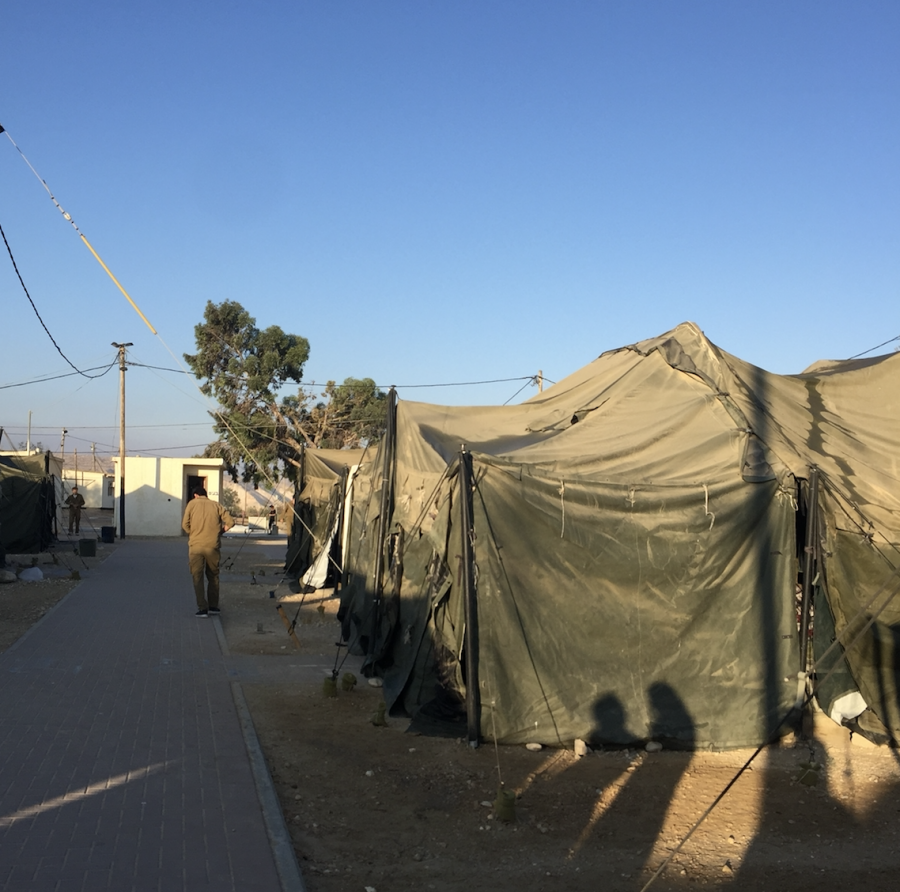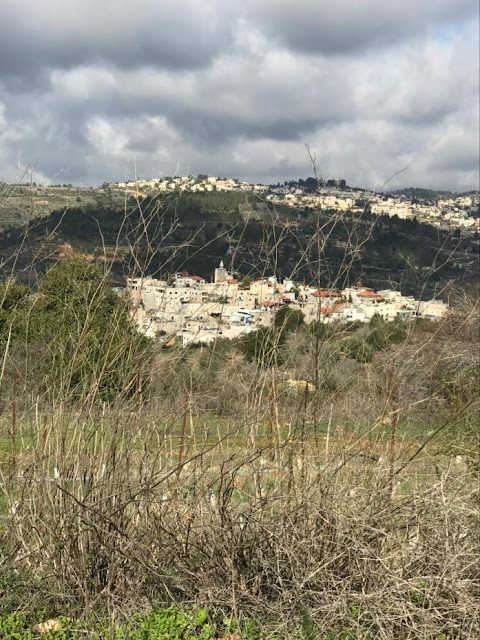Gadna: Experiencing the IDF
by Sasha Pullman 11th grade Southern California
After a day of Jewish History class and a meeting with Rabbi Rick Jacobs on the
kibbutz, we left for a 2-hour bus ride south to Sde Boker. It was pouring rain the entire way,
and I watched out the window as the landscape turned from grassy fields to dry deserts.
When we pulled in to the army base, I was nowhere near sure what to expect. In the weeks
prior, I was constantly being told to stay positive and smile, which was reason enough to be
scared. We were immediately rushed to put our things down, grab our hats and water, and
run over to the basketball court. I was told to stand in achshev, a position that now feels very
natural due to constant repetition. It was done with our feet together in a V-shape, and our
left foot must be touching our water bottle. Our hands also had to be behind our backs in a
diamond. Every part was very crucial, as the resulting punishment for not being in the exact
position was pushups.

The Semalet, or the Sergeant came to our lines and randomly assigned
us to one mefakedet, or commander who was the leader of our team of fourteen girls.
We went to our tents and I was struck by how serious everything already was. We got our
clothes which were a pair of pants, a button-down shirt, and an army liner.
What the tents looked like when they
were rolled up during the day.
It began to pour as we were getting
ready and our tent filled with water. It
was an interesting way to start the
week. We got our mattresses and made
our beds. The tent was extremely
cramped, not exactly a place I wanted
to be spending most of my time. We
practiced getting into a chet, and
standing in achshev. Anytime we
finished a break or meal we had to be
in this position at a certain time.
The
first night was somewhat rough. Many
people did not like the amount of rules
we had to follow or the living
situation. We were also in very close
quarters and had no personal space.
Nevertheless, we made it through the night.
Me and my friends in our uniforms one
morning.
The next day we began to talk about
weapons. It was difficult talking about
guns in a military context. I think many
of us previously viewed guns only as a
source of violence, not protection, and
it was evident that ideas about firearms
are very different in the U.S. than in
Israel. It was interesting talking to our
Mefakedet and explaining to her that
guns were a source of fear and
mourning for a lot of us. The state of
gun violence in America is one that I
am sensitive to, and it was very hard
for me to view guns outside of that
context. When we went to the shooting
range, I was surprised at how much the
sound of gunshots had scared me even
though it was in a safe and highly
controlled environment. I think this experience brought out the issue of gun violence in
America and compared the difference in culture very well. Many people expressed that it was
difficult as well, and it was very interesting to see how people viewed the experience of
shooting a gun when they are such as source of anxiety and polarization in America at the
moment. I also came to the understanding, however, that they are a vital source of protection,
and extremely important in protecting the land of Israel.
This is what the shooting
range looked like. Everyone
was lying down in the position
we learned the day before.
I learned many things, though
being somewhat
uncomfortable. I learned to
appreciate the comfort that I do have, and take advantage of experiences like this one, and
embrace what is unfamiliar. I also came to the understanding of the importance of the IDF to
many Israelis. The fact that many of them spend multiple years of their lives following orders
and giving up some freedom and individuality in order to protect their country. It is very
admirable, and I grew to appreciate the system much more through this experience.
We
learned about the difference between a national army and a professional army and understood
the pros of a national army. It heightens national identity and connects almost all citizens. It
also highlights the importance of protecting the country and being active in the nation. This
seemed to be very important since Israel is a small and somewhat new country surrounded by
conflict and the national army helps to aid citizens in uniting themselves and creating a
national feeling.
A big highlight of the experience was kitchen duty. A wonderful four hours of
cleaning the dining hall and kitchen after lunch on Tuesday. It was most definitely a time of
bonding and plentiful complaining. It was also, however, very satisfying to have cleaned up
after every person who ate lunch that day, and I understood the importance of working
together to complete tasks.
Some of us putting dishes away after
eating
In the end, we had the chance to
meet with our Mefakdot, and they were
all full of so much joy and laughter, even
though the entire week they had to remain
serious and impersonal. By the end, I
learned to embrace the uncomfortable,
and appreciate the amount of comfort I
possess regularly. I also was able to learn
how to view uncomfortable experiences
as privileges since I gained so much knowledge from this week. Most
importantly, I learned to have a greater respect for the Israeli Defence Forces,
and I admire the passion that many have to protect Eretz Yisrael.





